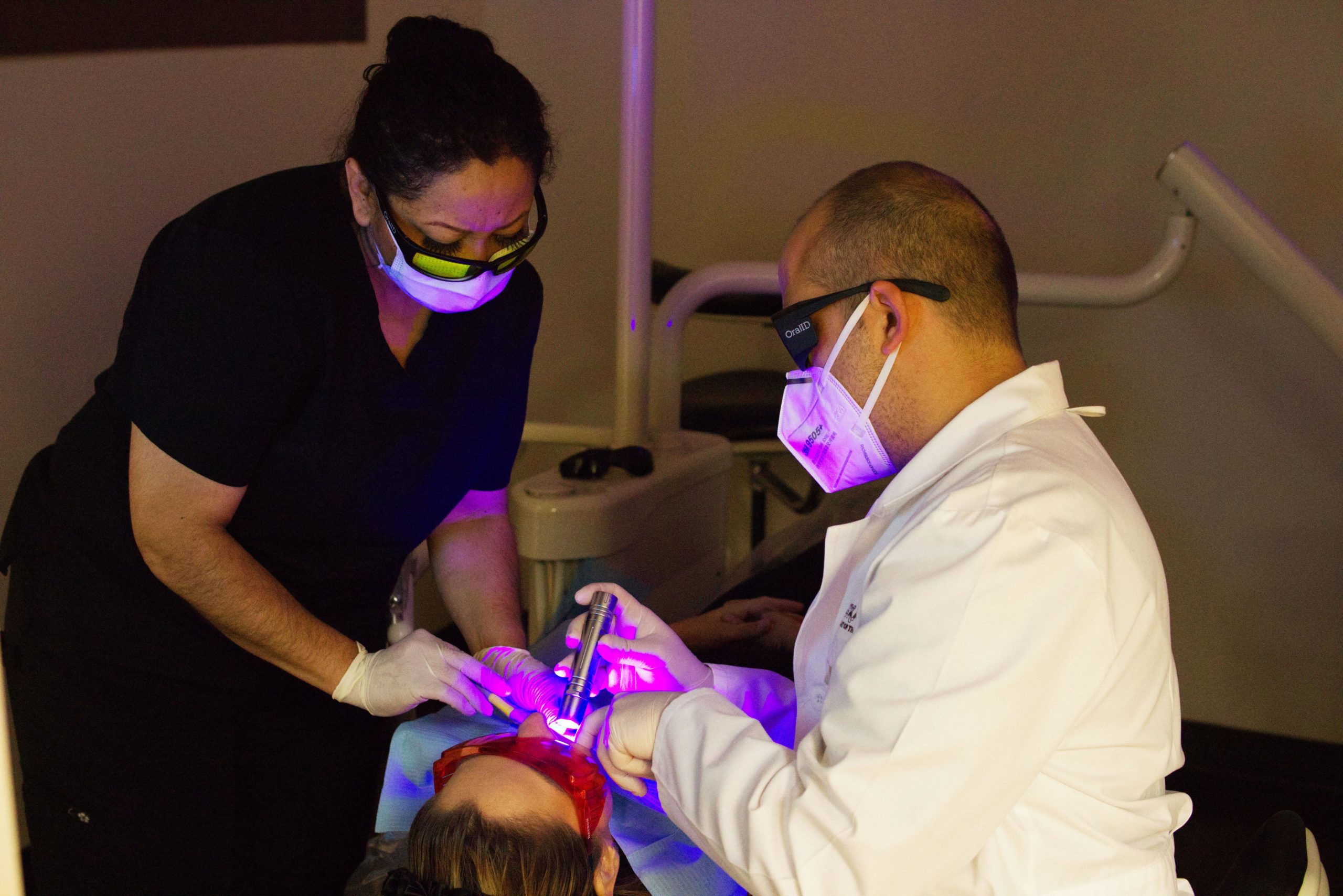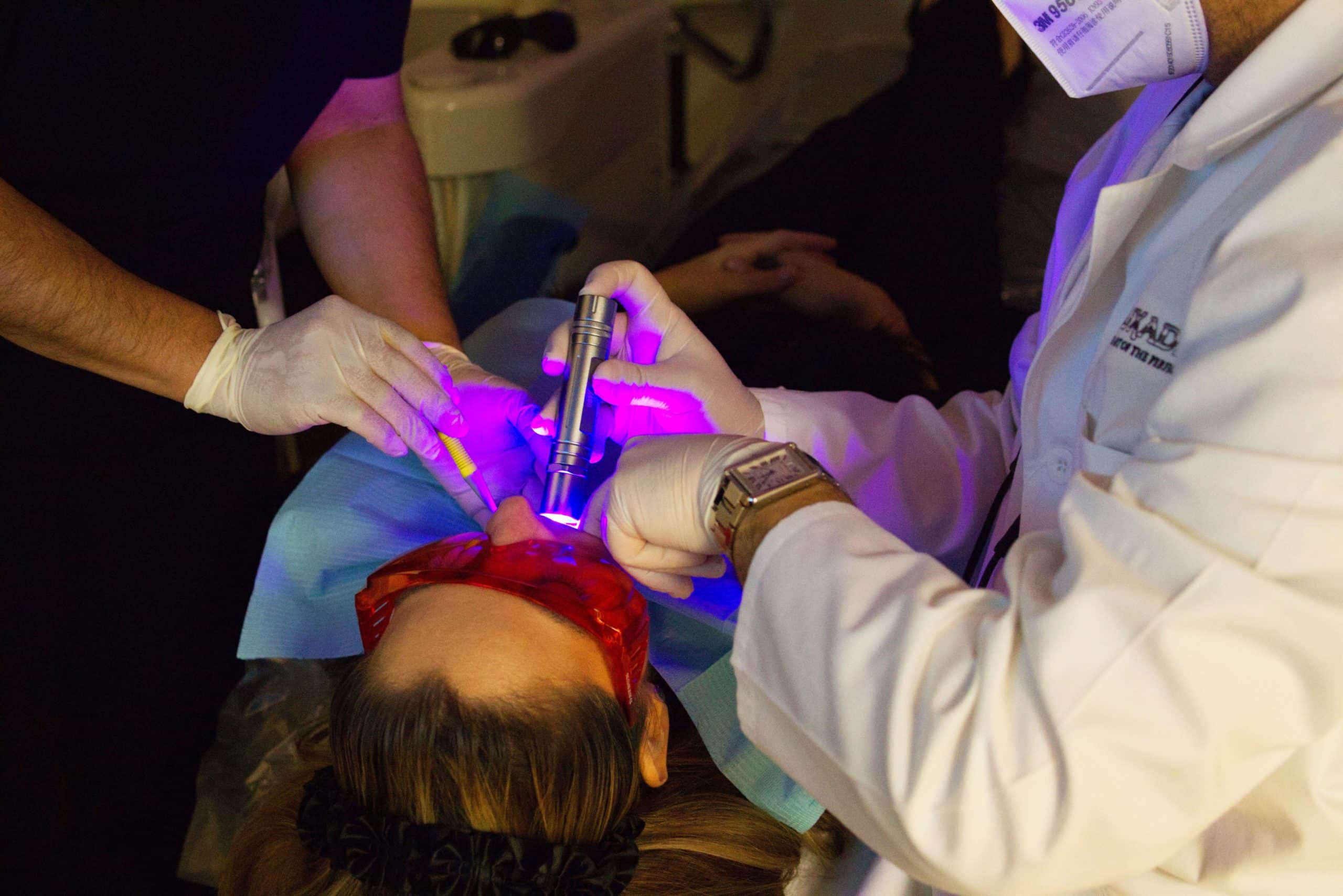April is Oral Cancer Awareness Month
At Luxadent, we have a thorough program of care, making sure our patients have radiant smiles. Our dentist isn’t just responsible for chasing after gum disease and cavities; they also conduct oral cancer screening and assess your overall oral health.
Cancer is a condition where cells start to grow uncontrollably in a specific part of the body and cause damage to surrounding tissue. In this article, we’ll learn everything you have to know about oral cancer and measures to prevent it.

What is oral cancer?
Oral cancer appears as a sore or lump within the mouth that does not recede. Oral cancer, which comprises cancers of the cheeks, the floor of the mouth, tongue, soft and hard palate, lips, pharynx, and sinuses, can be fatal if not diagnosed and treated early.
About 53,000 cases are diagnosed each year in the United States, which frequently occurs in people ages 40 and above. Oral cancers are usually detected after they’ve reached the lymph nodes of the neck. Early finding is a solution to surviving oral cancer.
Oral cancer symptoms
Early symptoms of oral cancer may be confused for other conditions, like a toothache or cold. If signs persist for several weeks or months, it is necessary to consult a doctor so that, if it’s oral cancer, it may be diagnosed promptly. To know what oral cancer look like, let’s check the following symptoms:
- Red patches in your mouth (erythroplakia)
- White patches in your mouth (leukoplakia)
- A growth on the tongue or lip, or in the mouth or throat
- Bleeding in the mouth
- Difficulty chewing or eating, speaking, or moving the jaw or tongue
- A change in the way your dentures fit together due to swelling of your jaw
- Numbness in your tongue or other areas of your mouth
- Sudden weight loss

What Causes Oral Cancer?
One of the primary causes of oral cancer is tobacco use. This includes smoking cigarettes, cigars, and pipes, along with chewing tobacco. Study further implies that secondhand smoke exposure as a child, heightens the risk of oral cancer as an adult.
Other risk factors include:
- Sun exposure. High exposure to sunlight (particularly at an early age) can cause cancer on the lips.
- Alcohol consumption. Drinking a high amount of alcohol can double your risk of having oral cancer. It appears to deepen your risk a lot more if you also smoked or chewed tobacco.
- Human papillomavirus (HPV). Some HPV strains are etiologic risk factors for Oropharyngeal Squamous Cell Carcinoma (OSCC)
- Family history of cancer. Having a family history of oral cancer is a risk factor, as some gene mutations can be passed down from parent to child.
- Age. Oral cancers most often occur in people 40 years old and above
- A weakened immune system
- Poor nutrition. A diet low in fruits and vegetables can increase the risk of oral cancer.
Oral Cancer Stages
There are four stages of oral cancer.

T4a: The tumor is developing into nearby structures. At this stage, oral cancer is called a moderately advanced local disease. Cancer cells may or may not be present in the lymph nodes, or they may have spread to one lymph node on the same side of the head or neck as the primary tumor and measures less than 3 cm.
T4b: The tumor has invaded deeper areas and/or tissue. At this stage, the cancer is called a very advanced local disease. And one of the following applies: It may or may not have spread to lymph nodes. It has spread to one or more lymph nodes larger than 6 cm across.
Recurrent oral cancer
Recurrent oral cancer is cancer that has reappeared after it was treated. When cancer manifests again, the staging process likewise begins again. You’ll perhaps be tested the same as those you had the first time to find out the degree of cancer.
Diagnosis and Oral cancer treatment
If some of the above-mentioned symptoms are detected, the doctor will administer some prescribed tests to diagnose the condition. It includes oral cancer screening exams and biopsy, (in some cases, endoscopy). Once cancer is diagnosed, tests will be carried out to determine the extent (stage) of cancer.
Oral cancer is generally treated with surgery (to remove the cancerous growth) or radiation (to destroy any remaining cancer cells) in the early stages. In more severe conditions, a combination of surgery and radiation is the typical treatment. In the late stages of oral cancer, a combination of radiation with chemotherapy, with or without surgery, is usually used.
Talk with your doctors regarding your treatment options. Consider the benefits and potential side effects of each option. Mull over your issues with your doctor before making a decision.
What Can I Do to Prevent Oral Cancer?
- Steer clear of tobacco and drink alcohol in moderation.
- Eat a healthy diet, especially with vegetables containing vitamin A.
- Limit sun exposure. When in the sun, use UV-A/B-blocking sun-protective lotions on your skin and lips.
- Since there is a connection with the HPV virus, young people engaging in oral sex have a higher risk of contracting oral cancer.
You can take an active part in spotting oral cancer early by doing the following:
- Conduct a self-exam at least once a month. See your dentist right away if you feel or see anything unusual such as grey, red, or white patches, sore areas, bumps, or lumps.
- Visit your dentist regularly. See a dentist at least every six months. However, the American Cancer Society suggests oral cancer screening exams every three years for individuals over 20y/o and yearly for those over age 40.
Outlook
With a healthy lifestyle, you can lower your risk of having oral cancer. Though you can’t avoid cancer completely, and it constitutes early detection, that is why your dentist’s examination is vital. The team at Luxadent knows what to find, and by detecting cancer while it’s still local, the probabilities of successful treatment are highest.
Schedule a consultation and an oral cancer screening by calling us at 832-462-6484 or fill out this form. We will make sure to connect you with the right person!
FAQ:
Is oral cancer curable?
Yes. Oral cancer is somewhat common. It can be cured if detected and treated at an early stage. A doctor or dentist usually detects oral cancer in its early stages since the mouth and lips are easy to screen.
What are the main types of oral cancer?
Nearly all oral cancers are squamous cell carcinomas. Therefore, treatment is usually conducted not by the cancer strain but by its location. The most common locations for cancer in the oral cavity are the gums, floor of the mouth, tongue, tonsils, and throat.
Does oral cancer hurt?
In the early stages, mouth cancer rarely causes any pain.
Can you die from oral cancer?
According to NIDCR, 60% of people with oral cancer survive for five(5) years. The earlier the stage at diagnosis, the greater the likelihood of survival after treatment.
